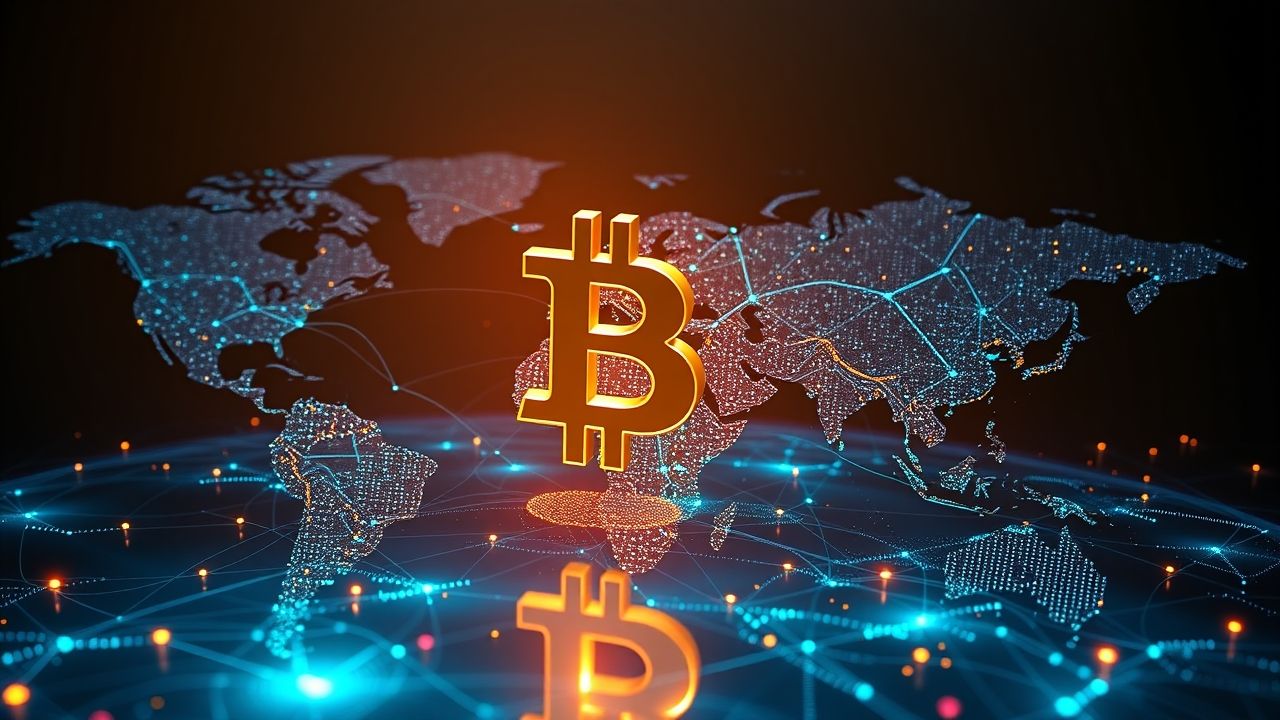Few phenomena in recent memory have captivated the world quite like bitcoin. From its enigmatic origins to its rollercoaster market performance, this digital currency has challenged traditional notions of finance, sovereignty, and trust. What began as a cypherpunk dream of decentralized money has blossomed, albeit tumultuously, into a global asset class, a technological marvel, and a subject of intense debate. As a journalist who has covered the intersection of technology and finance for over a decade, I’ve watched bitcoin evolve from an obscure internet curiosity to a significant player on the world stage, forcing central banks and governments to re-evaluate their monetary policies.
Key Summary
- Bitcoin’s Origins: Emerged in 2009, based on a white paper by the pseudonymous Satoshi Nakamoto, aiming for a decentralized digital cash system.
- Blockchain Technology: Underpins bitcoin, a distributed ledger that ensures transparency and immutability without central authority.
- Market Volatility: Known for extreme price swings, influenced by adoption, regulatory news, and macroeconomic factors.
- Evolving Perception: Increasingly viewed as ‘digital gold’ or a store of value, attracting institutional interest.
- Regulatory Challenges: Governments globally are grappling with how to classify and regulate this novel asset.
Why This Story Matters
The rise of bitcoin isn’t merely a tech story; it’s a profound commentary on the future of money, power, and individual liberty. Its existence challenges the very foundation of centralized financial institutions and offers an alternative vision for economic interaction. For investors, it represents a new frontier of opportunity and risk. For policymakers, it poses a complex puzzle of innovation versus control. And for the average citizen, it represents a chance to understand the disruptive forces reshaping our economic landscape. The implications of a globally accessible, permissionless financial system are vast, affecting everything from cross-border remittances to national fiscal policies.
The Genesis of Bitcoin and Blockchain
The story of bitcoin begins in the shadow of the 2008 financial crisis, a period of profound distrust in traditional banking. It was against this backdrop that a white paper titled “Bitcoin: A Peer-to-Peer Electronic Cash System” was published by an anonymous entity known only as Satoshi Nakamoto. This document outlined a revolutionary concept: a digital currency that could be sent directly from one party to another without the need for a financial institution, secured by cryptographic proof. The first bitcoin block, the ‘genesis block,’ was mined on January 3, 2009, containing a message referencing a newspaper headline about a UK bank bailout – a clear statement of intent.
The Decentralized Vision
At its core, bitcoin thrives on decentralization. Unlike fiat currencies issued by central banks, no single entity controls bitcoin. Transactions are verified by a network of computers around the world, known as ‘miners,’ and recorded on a public ledger called the blockchain. This distributed nature makes it incredibly resistant to censorship and manipulation, a key tenet for its early proponents.
How Mining Secures the Network
Bitcoin mining is the process by which new bitcoins are introduced into circulation, and new transactions are added to the blockchain. Miners use powerful computers to solve complex computational puzzles. The first miner to solve the puzzle gets to add the next block of transactions to the blockchain and is rewarded with newly minted bitcoins and transaction fees. This ‘proof-of-work’ mechanism is energy-intensive but is fundamental to the security and integrity of the entire bitcoin network, making it incredibly difficult for any single entity to gain control.
Market Dynamics and Unprecedented Volatility
Understanding bitcoin requires coming to terms with its characteristic volatility. While traditional assets might fluctuate by single-digit percentages annually, bitcoin can experience daily swings of 10% or more. This dynamic has both enthralled and terrified investors, creating overnight millionaires and significant losses. Factors driving this volatility are multifaceted, including macroeconomic news, regulatory announcements, technological developments, and even social media sentiment.
“In my 12 years covering financial markets, I’ve found that few assets defy conventional analysis quite like bitcoin. Its price movements are often less about traditional earnings reports or interest rate hikes, and more about the ebb and flow of global sentiment, adoption narratives, and the unpredictable impact of online communities. This makes it a fascinating, yet challenging, subject to cover.”
The halving event, occurring approximately every four years, is a pre-programmed reduction in the reward miners receive for validating transactions. This supply shock has historically preceded significant price rallies, as the rate of new bitcoin creation slows, reinforcing its scarcity principle.
The Regulatory Tightrope Walk
As bitcoin has grown in prominence, so too has the scrutiny from global regulators. Governments and financial authorities worldwide are grappling with how to classify and oversee this novel asset. Some nations, like El Salvador, have adopted bitcoin as legal tender, embracing its potential for financial inclusion and innovation. Others, like China, have implemented strict bans on cryptocurrency mining and trading, citing concerns over financial stability, energy consumption, and illicit activities. The majority fall somewhere in between, exploring frameworks for taxation, consumer protection, and anti-money laundering (AML) measures.
“Reporting from financial hubs across the globe, I’ve seen firsthand the wide spectrum of approaches governments are taking to bitcoin. From the cautious optimism in some European capitals to the outright hostility in others, it’s clear that no universal playbook exists. Each nation is attempting to balance the promise of innovation with the imperative of safeguarding their financial systems, leading to a fragmented and often confusing global regulatory landscape for crypto assets.”
The lack of a unified global regulatory framework creates challenges for businesses and investors operating across borders, but it also reflects the inherent difficulty in applying existing financial rules to a decentralized digital asset.
Bitcoin’s Evolving Role: From Digital Cash to Store of Value
Initially envisioned as a peer-to-peer electronic cash system, bitcoin’s narrative has evolved significantly. While some still champion its use for everyday transactions, its volatility and transaction costs have led many to view it more as a ‘digital gold’ or a long-term store of value, akin to a scarce commodity. This shift has been bolstered by increasing institutional interest.
Institutional Adoption and ETFs
The past few years have seen a surge in institutional involvement. Major corporations have added bitcoin to their balance sheets, and financial giants have launched investment products, most notably spot Bitcoin Exchange-Traded Funds (ETFs) in key markets. These developments have provided traditional investors with regulated and accessible avenues to gain exposure to bitcoin, legitimizing it further in mainstream finance.
The Lightning Network and Scalability
Addressing concerns about bitcoin’s scalability and transaction speed, the Lightning Network emerged as a layer-2 solution. It enables off-chain transactions to be processed almost instantly and with very low fees, with only the opening and closing balances settled on the main bitcoin blockchain. This innovation aims to enhance bitcoin’s utility as a medium of exchange for smaller, everyday payments.
Common Misconceptions About Bitcoin
Despite its growing prominence, bitcoin remains shrouded in several common misunderstandings:
- Exclusively for Illicit Activities: While early narratives focused on its use in dark web markets, data increasingly shows that illicit activity makes up a very small percentage of total bitcoin transactions. Its public, traceable blockchain often makes it less private than cash.
- Environmentally Destructive: Concerns about bitcoin’s energy consumption are valid, but the narrative often overlooks the increasing use of renewable energy by miners and the potential for mining operations to stabilize power grids.
- No Intrinsic Value: Critics argue bitcoin has no intrinsic value because it’s not backed by a government or physical asset. However, its value derives from its network effect, scarcity (capped at 21 million coins), security, and its utility as a decentralized, censorship-resistant digital asset.
- Unregulated Wild West: While less regulated than traditional finance, the crypto space is not entirely unregulated. Many exchanges comply with KYC/AML laws, and governments are actively developing and enforcing new regulations.
Expert Analysis and Future Outlook
The future of bitcoin remains a subject of intense speculation, yet the consensus among many experts points towards its continued integration into the global financial system. Its resilience through multiple bear markets and its consistent ability to attract new participants suggest it’s more than a fleeting fad. Experts often highlight its role as a hedge against inflation and a non-sovereign store of value, particularly appealing in an era of quantitative easing and geopolitical uncertainty.
Challenges, however, persist. Regulatory clarity is still needed in many jurisdictions, and technological hurdles around scalability and user experience are ongoing. Yet, the foundational promise of a decentralized, programmable form of money continues to drive innovation within the ecosystem. The ongoing development of layer-2 solutions, improvements in wallet technology, and the growing educational efforts are paving the way for broader adoption.
In conclusion, bitcoin has solidified its position as a transformative force. It compels us to rethink monetary policy, asset allocation, and the very nature of trust in a digital age. As a journalist, I continue to watch this space with fascination, convinced that its journey is far from over, and its influence will only continue to expand.
Frequently Asked Questions
Here are some common questions about bitcoin:
- What is Bitcoin? Bitcoin is a decentralized digital currency, without a central bank or single administrator, that can be sent from user to user on the peer-to-peer bitcoin network without the need for intermediaries.
- How is Bitcoin created? Bitcoin is created through a process called “mining,” where powerful computers solve complex mathematical problems to verify and add new transactions to the blockchain, earning new bitcoins as a reward.
- Is Bitcoin legal? The legality of bitcoin varies by country. While it is legal in many nations for use, ownership, and trading, some countries have restricted or banned it.
- Is Bitcoin a good investment? Bitcoin is considered a volatile and speculative investment. Its value can fluctuate wildly, and investors should be aware of the risks involved before investing.
- What is the blockchain? The blockchain is the underlying technology of bitcoin, a distributed, immutable public ledger that records all transactions across a network of computers, ensuring transparency and security.








